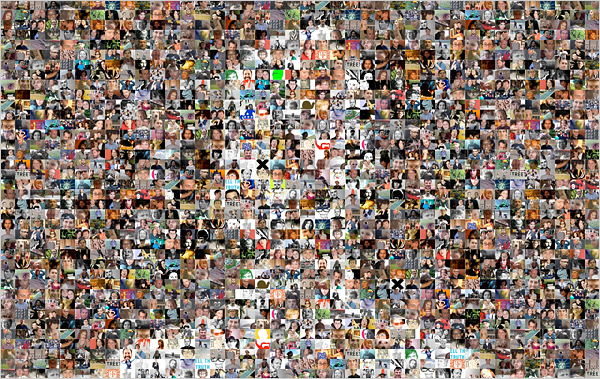That’s G.E. and E.E, not “Glee”. In social psychology circles GE means grandiose exhibitionism, while EE stands for entitlement / exploitativeness. Researchers find that having a large number of “ifriends”on social networks, such as Facebook, correlates with high levels of GE and EE. The greater the number of friends you have online, the greater the odds that you are a chronic attention seeker with shallow relationships or a “socially disruptive narcissist”.
[div class=attrib]From the Guardian:[end-div]
People who score highly on the Narcissistic Personality Inventory questionnaire had more friends on Facebook, tagged themselves more often and updated their newsfeeds more regularly.
The research comes amid increasing evidence that young people are becoming increasingly narcissistic, and obsessed with self-image and shallow friendships.
The latest study, published in the journal Personality and Individual Differences, also found that narcissists responded more aggressively to derogatory comments made about them on the social networking site’s public walls and changed their profile pictures more often.
A number of previous studies have linked narcissism with Facebook use, but this is some of the first evidence of a direct relationship between Facebook friends and the most “toxic” elements of narcissistic personality disorder.
Researchers at Western Illinois University studied the Facebook habits of 294 students, aged between 18 and 65, and measured two “socially disruptive” elements of narcissism – grandiose exhibitionism (GE) and entitlement/exploitativeness (EE).
GE includes ”self-absorption, vanity, superiority, and exhibitionistic tendencies” and people who score high on this aspect of narcissism need to be constantly at the centre of attention. They often say shocking things and inappropriately self-disclose because they cannot stand to be ignored or waste a chance of self-promotion.
The EE aspect includes “a sense of deserving respect and a willingness to manipulate and take advantage of others”.
The research revealed that the higher someone scored on aspects of GE, the greater the number of friends they had on Facebook, with some amassing more than 800.
Those scoring highly on EE and GG were also more likely to accept friend requests from strangers and seek social support, but less likely to provide it, according to the research.
Carol Craig, a social scientist and chief executive of the Centre for Confidence and Well-being, said young people in Britain were becoming increasingly narcissistic and Facebook provided a platform for the disorder.
“The way that children are being educated is focussing more and more on the importance of self esteem – on how you are seen in the eyes of others. This method of teaching has been imported from the US and is ‘all about me’.
“Facebook provides a platform for people to self-promote by changing profile pictures and showing how many hundreds of friends you have. I know of some who have more than 1,000.”
Dr Viv Vignoles, senior lecturer in social psychology at Sussex University, said there was “clear evidence” from studies in America that college students were becoming increasingly narcissistic.
[div class=attrib]Read the entire article after the jump.[end-div]
[div class=attrib]Image “Looking at You, and You and You”, Jennifer Daniel, an illustrator, created a fan page on Facebook and asked friends to submit their images for this mosaic; 238 of them did so. Courtesy of the New York Times.[end-div]

